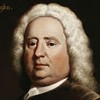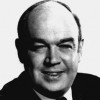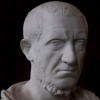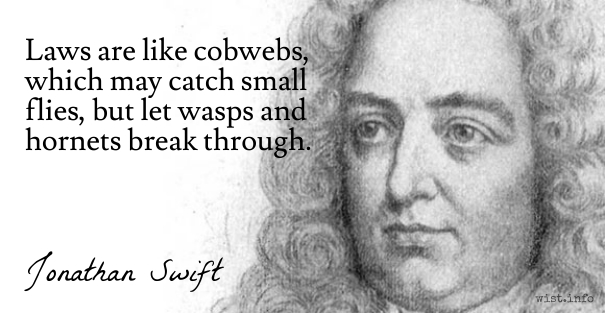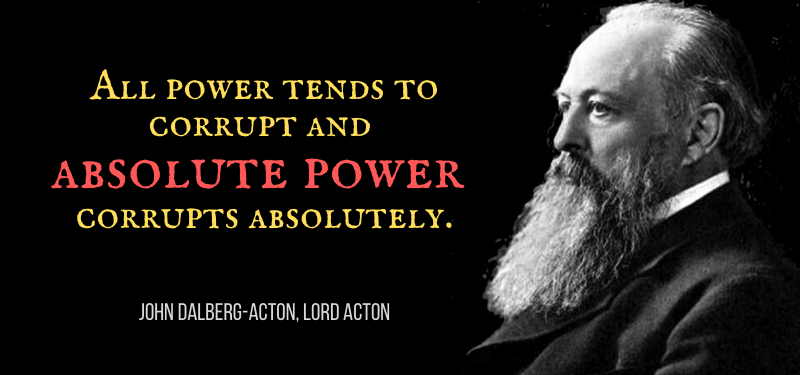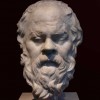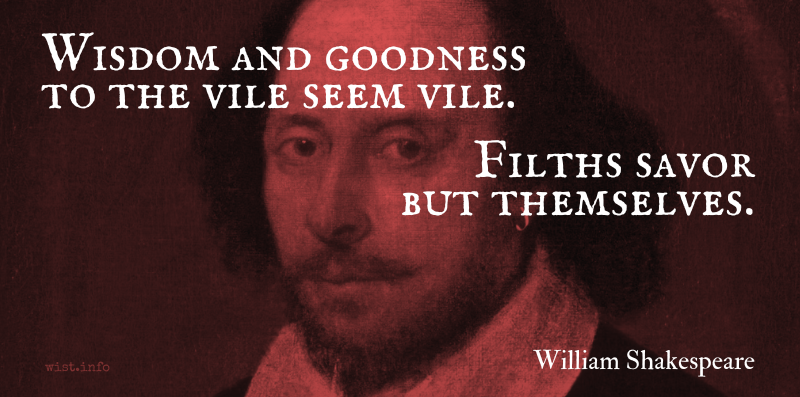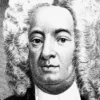No one just starts giggling and wearing black and signs up to become a villainous monster. How the hell do you think it happens? It happens to people. Just people. They make questionable choices, for what might be very good reasons. They make choice after choice, and none of them is slaughtering roomfuls of saints, or murdering hundreds of baby seals, or rubber-room irrational. But it adds up. And then one day they look around and realized that they’re so far over the line that they can’t remember where it was.
Quotations about:
corruption
Note not all quotations have been tagged, so Search may find additional quotes on this topic.
To read the front pages, you might conclude that Americans are mostly out for themselves, venal, grasping, and mean-spirited. The front pages have room only for defense contractors who cheat and politicians with their hands in the till. But you can’t travel the back roads very long without discovering a multitude of gentle people doing good for others with no expectation of gain or recognition. The everyday kindness of the back roads more than makes up for the acts of greed in the headlines.
There is one thing that Christ and all the Christian saints have said with a sort of savage monotony. They have said simply that to be rich is to be in peculiar danger of moral wreck. It is not demonstrably un-Christian to kill the rich as violators of definable justice. It is not demonstrably un-Christian to crown the rich as convenient rulers of society. It is not certainly un-Christian to rebel against the rich or to submit to the rich. But it is quite certainly un-Christian to trust the rich, to regard the rich as more morally safe than the poor.
Among the sayings & discourses imputed to [Jesus] by his biographers, I find many passages of fine imagination, correct morality, and of the most lovely benevolence: and others again of so much ignorance, so much absurdity, so much untruth, charlatanism, and imposture, as to pronounce it impossible that such contradictions should have proceeded from the same being. I separate therefore the gold from the dross; restore to him the former, & leave the latter to the stupidity of some, and roguery of others of his disciples. Of this band of dupes and impostors, Paul was the great Coryphaeus, and first corrupter of the doctrines of Jesus. These palpable interpolations and falsifications of his doctrines led me to try to sift them apart.
Thomas Jefferson (1743-1826) American political philosopher, polymath, statesman, US President (1801-09)
Letter to William Short (13 Apr 1820)
(Source)
On his personally abridged edition of the Bible.
No man ever became extremely wicked all at once.
[Nemo repente fuit turpissimus.]
But the greatest of all the Reformers of the depraved religion of his own country, was Jesus of Nazareth. Abstracting what is really his from the rubbish in which it is buried, easily distinguished by its lustre from the dross of his biographers, and as separable from that as the diamond from the dung hill, we have the outlines of a system of the most sublime morality which has ever fallen from the lips of man: outlines which it is lamentable he did not live to fill up. Epictetus & Epicurus give us laws for governing ourselves, Jesus a supplement of the duties & charities we owe to others. The establishment of the innocent and genuine character of this benevolent Moralist, and the rescuing it from the imputation of imposture, which has resulted from artificial systems,* invented by Ultra-Christian sects, unauthorized by a single word ever uttered by him, is a most desirable object, and one to which Priestley has successfully devoted his labors and learning. It would in time, it is to be hoped, effect a quiet euthanasia of the heresies of bigotry and fanaticism which have so long triumphed over human reason, and so generally & deeply afflicted mankind; but this work is to be begun by winnowing the grain from the chaff of the historians of his life.
* e.g. The immaculate conception of Jesus, his deification, the creation of the world by him, his miraculous powers, his resurrection & visible ascension, his corporeal presence in the Eucharist, the Trinity, original sin, atonement, regeneration, election, orders of Hierarchy, Etc.
Thomas Jefferson (1743-1826) American political philosopher, polymath, statesman, US President (1801-09)
Letter to William Short (31 Oct 1819)
(Source)
HENRY: What stronger breastplate than a heart untainted?
Thrice is he armed that hath his quarrel just,
And he but naked, though locked up in steel,
Whose conscience with injustice is corrupted.
But a short time elapsed after the death of the great reformer of the Jewish religion before his principles were departed from by those who professed to be his special servants, & perverted into an engine for enslaving mankind, and aggrandizing their oppressors in church & state: that the purest system of morals ever before preached to man has been adulterated & sophisticated, by artificial constructions, into a mere contrivance to filch wealth & power to themselves, that rational men not being able to swallow their impious heresies, in order to force them down their throats, they raise the hue & cry of infidelity, while themselves are the greatest obstacles to the advancement of the real doctrines of Jesus, and do in fact constitute the real Anti-Christ.
Thomas Jefferson (1743-1826) American political philosopher, polymath, statesman, US President (1801-09)
Letter to William Baldwin (unsent) (19 Jan 1810)
(Source)
Unlimited power is apt to corrupt the minds of those who possess it.
William Pitt the Elder (1708-1778) British statesman, orator [1st Earl of Chatham]
Speech, House of Lords (9 Jan 1770)
Regarding the case of John Wilkes. More famously stated by Lord Acton in 1887.
That therefore the proscribing any citizen as unworthy the public confidence by laying upon him an incapacity of being called to offices of trust and emolument, unless he profess or renounce this or that religious opinion, is depriving him injuriously of those privileges and advantages to which, in common with his fellow citizens, he has a natural right;
That it tends also to corrupt the principles of that very religion it is meant to encourage, by bribing, with a monopoly of worldly honours and emoluments, those who will externally profess and conform to it;
That though indeed these are criminal who do not withstand such temptation, yet neither are those innocent who lay the bait in their way.
Thomas Jefferson (1743-1826) American political philosopher, polymath, statesman, US President (1801-09)
“Virginia Statute for Religious Freedom” (18 Jun 1779; enacted 16 Jan 1786)
(Source)
In a virtuous community men of sense and principle will always be placed at the head of affairs. In a declining state of public morals men will be so blinded to their true interests as to put the incapable and unworthy at the helm. It is therefore vain to complain of the follies or crimes of a government. We must lay the hands on our own hearts and say, Here is the sin that makes the public sin.
It has often been said that power corrupts. But it is perhaps equally important to realize that weakness, too, corrupts. Power corrupts the few, while weakness corrupts the many. Hatred, malice, rudeness, intolerance, and suspicion are the faults of weakness. The resentment of the weak does not spring from any injustice done to them but from the sense of inadequacy and impotence. They hate not wickedness but weakness. When it is their power to do so, the weak destroy weakness wherever they see it.
Eric Hoffer (1902-1983) American writer, philosopher, longshoreman
The Passionate State of Mind, Aphorism 41 (1955)
(Source)
It is not said that evil arts were ever practised in Gondor, or that the Nameless One was ever named in honour there; and the old wisdom and beauty brought out of the West remained long in the realm of the sons of Elendil the Fair, and they linger there still. Yet even so it was Gondor that brought about its own decay, falling by degrees into dotage, and thinking that the Enemy was asleep, who was only banished not destroyed. Death was ever present, because the Númenoreans still, as they had in their Old Kingdom, and so lost it, hungered after endless life unchanging. Kings made tombs more splendid than houses of the living and counted old names in the rolls of their descent dearer than the names of sons. Childless lords sat in aged halls musing on heraldry; in secret chambers withered men compounded strong elixirs, or in high cold towers asked questions of the stars. And the last king of the line of Anárion had no heir.
J.R.R. Tolkien (1892-1973) English writer, fabulist, philologist, academic [John Ronald Reuel Tolkien]
The Lord of the Rings, Vol. 2: The Two Towers, Book 4, ch. 5 “The Window on the West” [Faramir] (1954)
(Source)
My opinion is that there would never have been an infidel, if there had never been a priest. The artificial structures they have built on the purest of all moral systems, for the purpose of deriving from it pence and power, revolts those who think for themselves, and who read in that system only what is really there.
For as man is the best of the animals when perfected, so he is the worst of all when sundered from law and justice. For unrighteousness is most pernicious when possessed of weapons, and man is born possessing weapons for the use of wisdom and virtue, which it is possible to employ entirely for the opposite ends. Hence when devoid of virtue man is the most unholy and savage of animals, and the worst in regard to sexual indulgence and gluttony.
Aristotle (384-322 BC) Greek philosopher
Politics [Πολιτικά], Book 1, ch. 2 / 1253a.31 [tr. Rackham (1932)]
(Source)
Alternate translations:
For man is an animal which, just as it is when fully perfected the best of all, so when separated from law and justice, is the worst of all. For injustice is most difficult to cope with when armed. Man is born into the world in the possession of arms, in the shape of practical wisdom and moral excellence, which he can use to the fullest degree for exactly contrary objects; when destitute of virtue, he is an animal most unholy and most savage, and most viciously disposed toward sensuality and gluttony.
[tr. Bolland (1877)]
For man, when perfected, is the best of animals, but, when separated from law and justice, he is the worst of all; since armed injustice is the more dangerous, and he is equipped at birth with arms, meant to be used by intelligence and virtue, which he may use for the worst ends. Wherefore, if he have not virtue, he is the most unholy and the most savage of animals, and the most full of lust and gluttony.
[tr. Jowett (1885)]
For as by the completion of it man is the most excellent of all living beings, so without law and justice he would be the worst of all, for nothing is so difficult to subdue as injustice in arms: but these arms man is born with, namely, prudence and valour, which he may apply to the most opposite purposes, for he who abuses them will be the most wicked, the most cruel, the most lustful, and most gluttonous being imaginable.
[tr. Ellis (1912)]
For just as man is the best of animals when completed, when separated from law and adjudication he is the worst of all. For injustice is harshest when it is furnished with arms, and man is born naturally possessing arms for prudence and virtue which nevertheless are very susceptible to being used for their opposites. That is why, without virtue, he is the most unholy and the most savage of animals, and the worst with regard to sex and food.
[tr. Lord (1984)]
All this was inspired by the principle — which is quite true in itself — that in the big lie there is always a certain force of credibility; because the broad masses of a nation are always more easily corrupted in the deeper strata of their emotional nature than consciously or voluntarily; and thus in the primitive simplicity of their minds they more readily fall victims to the big lie than the small lie, since they themselves often tell small lies in little matters but would be ashamed to resort to large-scale falsehoods.
When the issue is one of Truth and Justice, there can be no differentiating between small problems and great ones. For the general viewpoints on human behaviour are indivisible. People who fail to regard the truth seriously in small matters, cannot be trusted in matters that are great.
[Wenn es sich um Wahrheit und Gerechtigkeit handelt, gibt es nicht die Unterscheidung zwischen kleinen und grossen Problemen. Denn die allgemeinen Gesichtspunkte, die das Handeln der Menschen betreffen, sind unteilbar. Wer es in kleinen Dingen mit der Wahrheit nicht ernst nimmt, dem kann man auch in grossen Dingen nicht vertrauen …]
No sooner is a Temple built to God but the Devill builds a Chappell hard by.
George Herbert (1593-1633) Welsh priest, orator, poet.
Jacula Prudentum, or Outlandish Proverbs, Sentences, &c. (compiler), # 674 (1640 ed.)
(Source)
See also Martin Luther.
And now bills were passed, not only for national objects but for individual cases, and laws were most numerous when the commonwealth was most corrupt.
[Corruptissima re publica plurimae leges.]
If I was to really get at the burr in my saddle, it’s not politics — and this is, I think, probably a horrible analogy — but I look at politicians as, they are doing what inherently they need to do to retain power. Their job is to consolidate power. When you go to the zoo and you see a monkey throwing poop, you go, “that’s what monkeys do, what are you gonna do?” But what I wish the media would do more frequently is say “bad monkey.”
Jon Stewart (b. 1962) American satirist, comedian, and television host. [b. Jonathan Stuart Leibowitz]
Interview by Charlie Rose (2004-09-29)
Full text.
The highest proof of virtue is to possess boundless power without abusing it.
Thomas Babington Macaulay (1800-1859) English writer and politician
“The Life and Writings of Addison,” Edinburg Review (1843)
(Source)
Review of Lucy Aikin, The Life of Joseph Addison (1843).
He who fights with monsters should look to it that he himself does not become a monster. And when you gaze long into an abyss, the abyss gazes also into you.
[Wer mit Ungeheuern kämpft, mag zusehn, dass er nicht dabei zum Ungeheuer wird. Und wenn du lange in einen Abgrund blickst, blickt der Abgrund auch in dich hinein.]
Friedrich Nietzsche (1844-1900) German philosopher and poet
Jenseits von Gut und Böse [Beyond Good and Evil], Aphorism 146 (1886) [tr. Hollingdale (1973, 1990)]
(Source)
Alternate translations:
He who fights with monsters should be careful lest he thereby becomes a monster. And if thou gaze long into an abyss, the abyss will also gaze into thee.
[tr. Zimmern (1906)]
Whoever fights monsters should see to it that in the process he does not become a monster. And when you look long into an abyss, the abyss also looks into you.
[tr. Kaufmann (1966)]
Government has an obligation not to inhibit the collection and dissemination of news…. I’m convinced that if reporters should ever lose the right to protect the confidentiality of their sources then serious investigative reporting will simply dry up. The kind of resourceful, probing journalism that first exposed most of the serious scandals, corruption and injustice in our nation’s history would simply disappear …. And let me tell you, reading about one’s failings in the daily papers is one of the privileges of high office in this free country of ours.
Nelson Rockefeller (1908–1979) American politician
Speech to the Anti-Defamation League, Syracuse, NY (29 Nov 1972)
(Source)
I cannot accept your canon that we are to judge Pope and King unlike other men, with a favourable presumption that they did no wrong. If there is any presumption it is the other way against holders of power, increasing as the power increases. Historic responsibility has to make up for the want of legal responsibility. All power tends to corrupt and absolute power corrupts absolutely. Great men are almost always bad men, even when they exercise influence and not authority: still more when you superadd the tendency or the certainty of corruption by authority. There is no worse heresy than that the office sanctifies the holder of it.
John Dalberg, Lord Acton (1834-1902) British historian
Letter to Bp. Mandell Creighton (3 Apr 1887)
(Source)
Often paraphrased, "Power corrupts, and absolute power corrupts absolutely."
There is an alternate, probably spurious version of this quote, for which I have been unable to find an actual citation (except where it is mis-cited to this letter to Bp. Creighton): "And remember, where you have a concentration of power in a few hands, all too frequently men with the mentality of gangsters get control. History has proven that. All power corrupts; absolute power corrupts absolutely." As the word "gangster" has only been traced back to 1886, and that in the US, its use by Acton (esp. in a modern sense) seems unlikely.
Never open the door to a lesser evil, for other and greater ones invariably slink in after it.
[Nunca se le ha de abrir la puerta al menor mal, que siempre vendrán tras él otros muchos, y mayores, en celada.]
Baltasar Gracián y Morales (1601-1658) Spanish Jesuit priest, writer, philosopher
The Art of Worldly Wisdom [Oráculo Manual y Arte de Prudencia], § 31 (1647) [tr. Jacobs (1892)]
(Source)
(Source (Spanish)). Alternate translations:
We must not open the door to the least evil, for others, and those greater too, which lie in ambush come always after.
[Flesher ed. (1685)]
Never open the door to a small misfortune, for many more always creep in behind it, and greater ones, under its protection.
[tr. Fischer (1937)]
Never open the door to the least of evils, for many other, greater ones lurk outside.
[tr. Maurer (1992)]
The children now love luxury; they have bad manners, contempt for authority; they show disrespect for elders and love chatter in place of exercise. Children are now tyrants, not the servants of their households. They no longer rise when elders enter the room. They contradict their parents, chatter before company, gobble up dainties at the table, cross their legs, and tyrannize their teachers.
Socrates (c.470-399 BC) Greek philosopher
(Spurious)
Often claimed as a passage from Socrates via Plato, but actually a paraphrase from a synthesis of complaints about youth in antiquity by Kenneth John Freeman, in his 1907 Cambridge dissertation "Schools of Hellas: an Essay on the Practice and Theory of Ancient Greek Education from 600 to 300 BC." See here for more discussion.
ALBANY: Wisdom and goodness to the vile seem vile.
Filths savor but themselves.William Shakespeare (1564-1616) English dramatist and poet
King Lear, Act 4, sc. 2, l. 47ff (4.2.47-48) (1606)
(Source)
LEAR: Through tattered clothes small vices do appear.
Robes and furred gowns hide all. Plate sin with gold,
And the strong lance of justice hurtless breaks.
Arm it in rags, a pygmy’s straw does pierce it.William Shakespeare (1564-1616) English dramatist and poet
King Lear, Act 4, sc. 6, l. 180ff (4.6.180-183) (1606)
(Source)
Never regard something as doing you good if it makes you betray a trust, or lose your sense of shame, or makes you show hatred, suspicion, ill will, or hypocrisy, or a desire for things best done behind closed doors.
[Μὴ τιμήσῃς ποτὲ ὡς συμφέρον σεαυτοῦ, ὃ ἀναγκάσει σέ ποτε τὴν πίστιν παραβῆναι, τὴν αἰδῶ ἐγκαταλιπεῖν, μισῆσαί τινα, ὑποπτεῦσαι, καταράσασθαι, ὑποκρίνασθαι, ἐπιθυμῆσαί τινος τοίχων καὶ παραπετασμάτων δεομένου.]
Marcus Aurelius (AD 121-180) Roman emperor (161-180), Stoic philosopher
Meditations, Book 3, #7 [tr. Hays (2003)]
(Source)
Original Greek. Alternate translations:
Never esteem of anything as profitable, which shall ever constrain thee either to break thy faith, or to lose thy modesty; to hate any man, to suspect, to curse, to dissemble, to lust after anything, that requireth the secret of walls or veils.
[tr. Casaubon (1634), #8]
Don't be fond of any thing, or think that for your interest, which makes you break your word, quit your modesty, be of a dissembling, suspicious, or outrageous humor; which puts you up on hating any person, and inclines you to any practice, which won't bear the light, and look the world in the face.
[tr. Collier (1701)]
Never value anything as profitable to thyself which shall compel thee to break thy promise, to lose thy self-respect, to hate any man, to suspect, to curse, to act the hypocrite, to desire anything which needs walls and curtains.
[tr. Long (1862)]
Think nothing for your interest which makes you break your word, quit your modesty, hate, suspect, or curse any person, or inclines you to any practice which will not bear the light and look the world in the face.
[tr. Zimmern (1887)]
Never esteem anything as of advantage to thee that shall make thee break thy word or lose thy self-respect.
[tr. Morgan, in Bartlett's (1894)]
Never value as an advantage to yourself what will force you one day to break your word, to abandon self-respect, to hate, suspect, execrate another, to act a part, to covet anything that calls for walls or coverings to conceal it.
[tr. Farquharson (1944)]
Never value the advantages derived from anything involving breach of faith, loss of self-respect, hatred, suspicion, or execration of others, insincerity, or the desire for something which hast to be veiled and curtained.
[tr. Staniforth (1964)]
Never value as beneficial to yourself something that will force you one day to break your word, abandon your sense of shame, hate, suspect, or curse someone else, pretend, or desire something that needs the secrecy of walls or curtains.
[tr. Gill (2013)]
Value nothing which compels you to break your promise, to abandon your honor, to hate, suspect or curse anyone, to be a hypocrite, or to lust after anything which needs walls or decorations.
[tr. @sentantiq (2019)]
Some causes will force you to betray faith, abandon shame, hate or suspect another person, call down curses, put forward explanations, or desire something that requires walls and fences. Do not regard these causes as necessary or beneficial to yourself.
[Source]
It is enough that the people know there was an election. The people who cast the votes decide nothing. The people who count the votes decide everything.
[Я считаю, что совершенно неважно, кто и как будет в партии голосовать; но вот что чрезвычайно важно, это – кто и как будет считать голоса.]
Josef Stalin (1879-1953) Georgian revolutionary and Soviet dictator
Comment (1923)
Alternate translation: "Those who cast the votes decide nothing. Those who count the votes decide everything."
Alternate translation: "I consider it completely unimportant who in the party will vote, or how; but what is extraordinarily important is this -- who will count the votes, and how." Quoted in B. Bazhanov, The Memoirs of Stalin's Former Secretary (1992) [Борис Бажанов. Воспоминания бывшего секретаря Сталина], regarding elections to the Central Committee of the Communist Party.
The quotation is considered dubious by a number of sources.
The phrase was used by Tom Stoppard in Jumpers (1972): "It's not the voting that's democracy, it's the counting."
It is of great importance to set a resolution, not to be shaken, never to tell an untruth. There is no vice so mean, so pitiful, so contemptible and he who permits himself to tell a lie once, finds it much easier to do it a second and third time, till at length it becomes habitual, he tells lies without attending to it, and truths without the world’s believing him. This falsehood of the tongue leads to that of the heart, and in time depraves all it’s good dispositions.
Thomas Jefferson (1743-1826) American political philosopher, polymath, statesman, US President (1801-09)
Letter to Peter Carr (19 Aug 1785)
(Source)
How long we can hold our ground I do not know. We are not incorruptible; on the contrary, corruption is making a sensible tho’ silent progress. Offices are as acceptable here as elsewhere, and when once a man has cast a longing eye on them, a rottenness begins in his conduct.
Thomas Jefferson (1743-1826) American political philosopher, polymath, statesman, US President (1801-09)
Letter to Tench Coxe (21 May 1799)
(Source)




